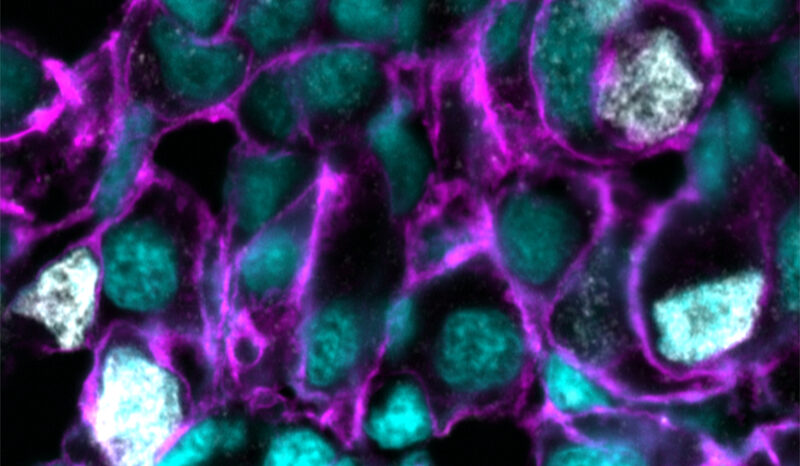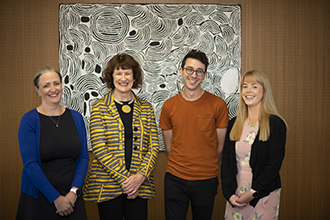Doggett K, Morgan KJ, Olthof AM, Mieruszynski S, Williams BB, Garnham AL, Milevskiy MJG, Whitehead L, Coates J, Buchert M, O’Donoghue RJJ, Hall TE, Putoczki TL, Ernst M, Sutherland KD, Kanadia RN, Heath JK. Inhibition of the minor spliceosome restricts the growth of a broad spectrum of cancers. EMBO Reports. 2025;26(15):10.1038/s44319-025-00511-8
Olthof AM, Schwoerer CF, Girardini KN, Weber AL, Doggett K, Mieruszynski S, Heath JK, Moore TE, Biran J, Kanadia RN. Taxonomy of introns and the evolution of minor introns. Nucleic Acids Research. 2024;52(15):10.1093/nar/gkae550
Morgan KJ, Doggett K, Geng F, Mieruszynski S, Whitehead L, Smith KA, Hogan BM, Simons C, Baillie GJ, Molania R, Papenfuss AT, Hall TE, Ober EA, Stainier DY, Gong Z, Heath JK. ahctf1 and kras mutations combine to amplify oncogenic stress and restrict liver overgrowth in a zebrafish model of hepatocellular carcinoma. eLife. 2023;12:10.7554/elife.73407
Lobert VH, Skardal ML, Malerød L, Simensen JE, Algra HA, Andersen AN, Fleischer T, Enserink HA, Liestøl K, Heath JK, Rusten TE, Stenmark HA. PHLPP1 regulates CFTR activity and lumen expansion through AMPK. Development. 2022;149(20):10.1242/dev.200955
Heath J, Cory S, Steitz J. Joan Heath interviews Suzanne Cory and Joan Steitz: a female perspective of science in the swinging ‘60s. Disease Models & Mechanisms. 2022;15(5):10.1242/dmm.049609
Grohmann C, Magtoto CM, Walker JR, Chua NK, Gabrielyan A, Hall M, Cobbold SA, Mieruszynski S, Brzozowski M, Simpson DS, Dong H, Dorizzi B, Jacobsen AV, Morrish E, Silke N, Murphy JM, Heath JK, Testa A, Maniaci C, Ciulli A, Lessene G, Silke J, Feltham R. Development of NanoLuc-targeting protein degraders and a universal reporter system to benchmark tag-targeted degradation platforms. Nature Communications. 2022;13(1):10.1038/s41467-022-29670-1
Koltowska K, Okuda KS, Gloger M, Rondon-Galeano M, Mason E, Xuan J, Dudczig S, Chen H, Arnold H, Skoczylas R, Bower NI, Paterson S, Lagendijk AK, Baillie GJ, Leshchiner I, Simons C, Smith KA, Goessling W, Heath JK, Pearson RB, Sanij E, Schulte-Merker S, Hogan BM. The RNA helicase Ddx21 controls Vegfc-driven developmental lymphangiogenesis by balancing endothelial cell ribosome biogenesis and p53 function. Nature Cell Biology. 2021;23(11):10.1038/s41556-021-00784-w
Olthof AM, White AK, Mieruszynski S, Doggett K, Lee MF, Chakroun A, Aleem AKA, Rousseau J, Magnani C, Roifman CM, Campeau PM, Heath JK, Kanadia RN. Disruption of exon-bridging interactions between the minor and major spliceosomes results in alternative splicing around minor introns. Nucleic Acids Research. 2021;49(6):10.1093/nar/gkab118
Doggett K, Williams BB, Markmiller S, Geng F-S, Coates J, Mieruszynski S, Ernst M, Thomas T, Heath JK. Early developmental arrest and impaired gastrointestinal homeostasis in U12-dependent splicing-defective Rnpc3-deficient mice. RNA. 2018;24(12):10.1261/rna.068221.118
Baell JB, Leaver DJ, Hermans SJ, Kelly GL, Brennan MS, Downer NL, Nguyen N, Wichmann J, McRae HM, Yang Y, Cleary B, Lagiakos HR, Mieruszynski S, Pacini G, Vanyai HK, Bergamasco MI, May RE, Davey BK, Morgan KJ, Sealey AJ, Wang B, Zamudio N, Wilcox S, Garnham AL, Sheikh BN, Aubrey BJ, Doggett K, Chung MC, de Silva M, Bentley J, Pilling P, Hattarki M, Dolezal O, Dennis ML, Falk H, Ren B, Charman SA, White KL, Rautela J, Newbold A, Hawkins ED, Johnstone RW, Huntington ND, Peat TS, Heath JK, Strasser A, Parker MW, Smyth GK, Street IP, Monahan BJ, Voss AK, Thomas T. Inhibitors of histone acetyltransferases KAT6A/B induce senescence and arrest tumour growth. Nature. 2018;560(7717):10.1038/s41586-018-0387-5




